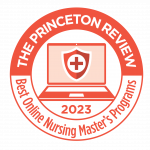Mission Statement
The School of Nursing is committed to educating students at the undergraduate and graduate levels as leaders in the delivery of quality health care and advancement of the nursing profession.
Philosophy
Excellence in nursing education is achieved through dedicated nursing faculty and their ongoing commitment to teaching/learning, student success, scholarship, and service to the community. The process of learning involves student-teacher partnerships and cooperation in meeting student and program goals. The nursing faculty serves as role models who guide students in developing an understanding of the discipline and in developing leadership, accountability, cultural competence, safe and ethical practice, and interdisciplinary collaboration. Learning is a life-long endeavor that fosters intellectual and personal growth through critical thinking, active inquiry and creative endeavors.
• Profession: Nursing is a professional discipline concerned with meeting the health needs of a diverse and changing society. As a profession nursing is legally and ethically accountable to society for the integrity and outcomes of its practice. Professional nursing is an art and a science grounded in general education and derived from the synthesis of empirical knowledge, aesthetics, personal knowledge, and ethics. Nursing knowledge is built through scholarly inquiry and study, self-reflection, and a variety of clinical and professional experiences.
• Practice: Nursing practice includes direct and indirect care, prevention and treatment of disease and illness, management of symptoms, and promotion of the health and well-being of self, individuals, families, groups, communities, and populations. Professional nursing practice requires the acquisition of knowledge, competencies and values; role development; self-awareness; and acceptance of sociopolitical, ethical and professional responsibilities. Caring is fundamental to nursing and encompasses the characteristics of empathy, compassion, sensitivity, and the ability to connect with patients with thoughtful attention to patient’s needs, interests, and values.
• People: Nurses believe people are holistic beings with inherent dignity and worth who have the right and responsibility to participate in decisions that affect their health. Health is a dynamic state of physical, spiritual, emotional and psychosocial being, affected by genetics, environmental factors, personal behaviors, and abilities to adapt in a rapidly evolving environment. Health is expressed in terms of perceived wellness and illness, both of which can occur in the presence or absence of disease.
Adopted by Faculty Organization: April 5, 1996
Revised by Faculty Organization: March 7, 2003
Revised by Faculty Organization: August 22, 2003
Revised by Faculty Organization: November 13, 2009
Revised by Faculty Organization: February 20, 2015
Revised by Faculty Organization: November 21, 2015
Revised by Faculty Organization: November 18, 2020




